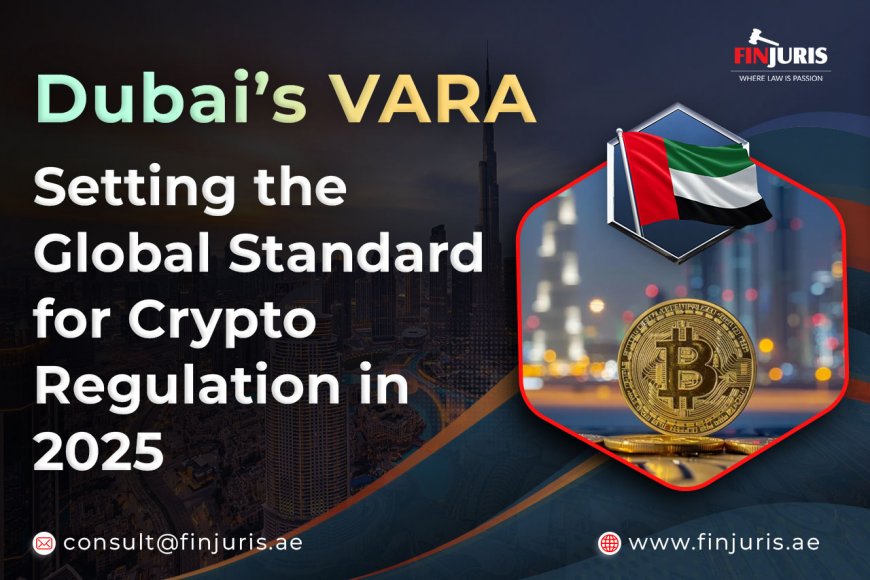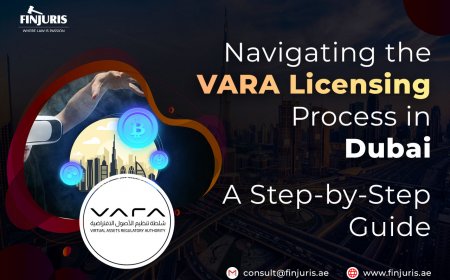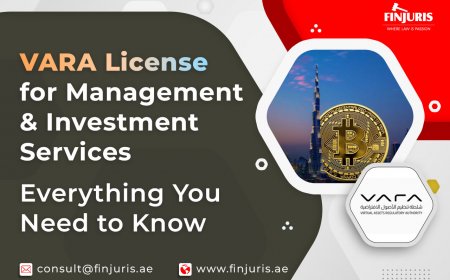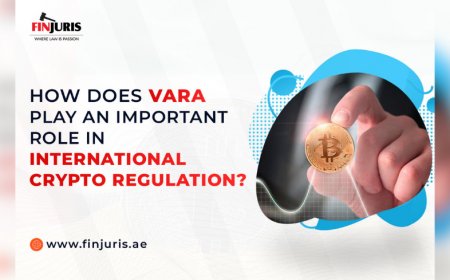Dubai’s VARA: Setting the Global Standard for Crypto Regulation in 2025
Dubai’s VARA leads global crypto regulation in 2025, fostering innovation, investor protection, and blockchain industry growth.

For decades, Dubai has branded itself as a city built on innovation, speed and connectedness to the world. From building the world's tallest skyscraper to establishing one of the busiest international airports, the emirate hasn't found much in the past few decades that it can't charge forward with in a non-linear fashion. In recent years, when cryptocurrencies and blockchain technology began to disrupt financial systems, Dubai's leaders did what they do best: rather than taking a wait-and-see approach as crypto established itself, they aggressively chose to regulate, structure and define the crypto economy from the outset.
The culmination of this ambition came to fruition in 2022 in the establishment of the Virtual Assets Regulatory Authority (VARA) in March 2022, Regulation No. 4 of 2022. Unlike other regulators that added oversight through their existing financial regulatory agencies, Dubai created an independent body based solely on virtual assets. This was no small step; this was both a symbolical and functional step to the global market that Dubai was willing to give crypto its own institutional body.
VARA’s Purpose: Beyond Regulation
From the start, VARA was not intended to be just a regulator. Instead, VARA took on the challenge of providing protection while encouraging innovation, giving freedom to entrepreneurs to try new digital asset products while establishing protections for investors against fraud, volatility, and systemic risk.
Deepa Raja Carbon, VARA’s Managing Director, aptly highlighted both the regulatory and innovation balancing act when she said that VARA’s work isn’t about attracting wealthy people or financial institutions, but about building a system that works for “the five billion people around us in the world, in our neighbourhood, at least.” This gives a clear indication of VARA’s intention in creating an inclusive, regional, and global framework in Dubai.
Today, VARA has licensed around 30 firms, including major global exchanges like Binance, which was being challenged in places like the U.S. and Europe, but found a clearly structured channel to operate with under Dubai’s clear pathway.
Read More: VARA and Crypto: The Function of VARA in Protecting Investors in the Crypto Market
A Framework Designed for Clarity
At the heart of Dubai's crypto legal framework is the Virtual Assets and Related Activities Regulations of 2023. These regulations provide clarity around who can operate in the crypto ecosystem, what standard they must comply with, and when and how enforcement will take place. VARA's framework is comprehensive, covering everything from exchanges, custodians, and advisory firms to NFT platforms and tokenized services. In contrast to jurisdictions that use a piecemeal approach to provide guidance, Dubai’s ecosystem approach should facilitate firms entering and sampling if the emirate meets their funding and operational needs.
Licensing is not just an extension of a rubber stamp. It requires applicants to comply with robust AML/KYC protocols, demonstrate cyber and information technology systems that are commensurate with risk, stay capital adequate, and build transparent governance structures. Dubai has made it very clear that they do not want to be categorized as a place with no rules. What the emirate wants to be known as is a place free-standing in innovation, but under a structure of rules and discipline, and hopefully in contrast to the rest of the world.
Variety differs from some free zones that present a specified scope, as the jurisdiction of VARA extends across Dubai's mainland and nearly all other free zones, except the Dubai International Financial Centre (DIFC). The DIFC has its own regulator, so VARA becomes the primary access point for firms that want Dubai-issued licenses.
Read More: VARA License for Management & Investment Services: Everything You Need to Know
Recognizing Dubai's Future in Crypto Regulation
Dubai has a unique advantage as the first, the clearest, and the most global jurisdiction. By opening VARA before most other important financial centers had put flags in the sand, Dubai owned the narrative. High profile exchanges like Crypto.com, OKX, Coinbase, and others quickly rushed to set a presence there, looking for the credibility and operational clarity that come with a VARA license.
Read More: A Step-by-Step Guide on How to Obtain a VARA License in Dubai
VARA has also garnered attention beyond licensing, becoming the first regulator to open an office in the metaverse. The implication here is that VARA has not just entered the digital finance arena, it has stepped into the immersion and decentralized experiences of tomorrow. This shows Dubai's commitment to the future of decentralized Web3 ecosystems, which is taking a stance that allows the regulatory regime to live where the technology lives, which is more than its Western peers.
While Abu Dhabi's Financial Services Regulatory Authority (FSRA) is laying down institutional-grade frameworks rooted in common law, and the Dubai International Finance Centre (DIFC) has taken a more conservative approach to limited crypto activities, VARA will have a competitive advantage as being more flexible, dynamic, and consumer driven making Dubai attractive to not just crypto-native entrepreneurs, but institutional finance too.
Tokenized Real Estate: Dubai’s Flagship Case Study
The area where VARA has already made the biggest splash is in the realm of tokenized real estate. In several pilot projects, entire apartment complexes in Dubai were sold in the form of blockchain tokens, and developers were overwhelmed with buyers from over 35 countries who bought the whole project in less than 60 minutes. This experimentation de-risked and demonstrated the huge global appetite for real estate that can be fractionalized, traded, and liquid like any digital asset.
The ambition of the emirate is expansive: by 2033 the Government of Dubai aims for 7% of its entire real estate market worth 16 billion to become tokenized. If a city like Dubai that is already recognized for its iconic skyscrapers and luxury can turn real estate into a blockchain-native asset subclass, it may completely change the economics of real estate investing around the world. Even a fractional ownership structure could allow the Dubai real estate market to be opened up to middle-class investors around the world, while blockchain technology, even with its temporary flaws, provides a transparent and immutable ownership transfer record.
For developers and owners of real estate assets, tokenization reduces their reliance on one or two deep-pocketed upper-class buyers. For regulators, it offers an alternative for real estate capital flows and provides a transparent and traceable capital flow pathway. For Dubai, it is yet another method to merge its real estate fuelled economy with the future of finance.
Read More: Real Estate Tokenization: Revolutionizing Property Investment
Establishing Confidence with Traditional Finance
VARA's credibility is in its ability to bring in traditional financial firms into the crypto fold. When Japanese banking giant Nomura decided to initiate its crypto operations from Dubai, it did so because of a VARA license approval which gave executives in Tokyo legal comfort that activities could be conducted under familiar and traditional law.
This is important because such actions bridge the traditional finance world with the digital asset world and provides the comfort for institutional capital, that had been reluctant about entering the crypto space, to do so. The existence of regulated entities in Dubai provides a level of comfort that all of these activities in the emirate are not simply hype but rather part of a valid, sustainable digital asset ecosystem.
A Region Hungry for Stability
VARA's mission is not just a global one, it's also a regional one. The Middle East, North Africa and South Asia are all fast-growing populations with demand for alternatives to the rapidly changing value of their local currencies. Reports state that 7% of global crypto transaction volume is coming from this area, while about one quarter of UAE’s population has some form of a digital asset.
By legitimizing/getting the structure of crypto right, Dubai isn't just aiming at international players and partners, it is also satisfying a local and regional population in search of stability, investment prospects, and access to modern financial solutions.
Framework for Growth
The other unique aspect of VARA is VARA’s rigorous controls on marketing activity, influencer promotions and crypto events. In a time when social media hype has caused extreme speculation and loss for retail participants, VARA eventually determined that transparent and truthful crypto promotions in Dubai are a must.
This includes events on a global stage. Friendly conferences like TOKEN2049 in Dubai in 2025 saw over 15,000 attendees and clearly benefitted from VARA’s oversight, and VARA ensures that discussions and promotions happen within a framework of trust. These measures strike an equilibrium: making Dubai the venue for some of the liveliest crypto events in the world, while ensuring Dubai maintains its reputation as a legitimate regulatory jurisdiction.
Challenges and Global Impact
Of course, VARA's path will not be without challenges. Since the UAE was put on the FATF grey list in 2022, Dubai has been under a spotlight to show strong anti-money laundering and counter terrorist financing requirements. Many of VARA's strict regulatory design is to show that UAE can manage risk and opportunity.
Other jurisdictions are also monitoring VARA very closely. The U.S. is facing a struggle with fragmented regulatory authorities competing for jurisdiction and oversight. Europe is implementing MiCA (Markets in Crypto-Assets Regulation) but moving slowly. Singapore and Hong Kong remain strong players but have taken narrower approaches. Dubai and VARA, in contrast, are offering a comprehensive, flexible, and exportable opportunity.
If VARA is successful, it can set the precedent for crypto regulations in the same way that English common law or Swiss banking rules formed precedents in prior eras of finance.
The Virtual Assets Regulatory Authority (VARA) in Dubai is not simply another regulator; it is defined by the emirate's mindset- to move fast, provide structure, and attract the best talent and capital on the planet. In three years, VARA has done what many larger economies haven’t done: created a legal framework that offers clarity, enforceability, and innovation in crypto while balancing growth and responsibility.
From licensing exchanges like Binance to piloting billions worth of tokenised real estate, VARA is actively taking Dubai to the leading edge of finance transformation. With rules on marketing, it is pushing the conversation in the metaverse and can embrace traditional banks while innovating alongside crypto Generative AI startups, demonstrating that Dubai is not just a city proclaiming that it’s part of the digital revolution; it is shaping the revolution and direction of our finance ecosystem.
For investors, this means they can trust expectation. For entrepreneurs, expecting the chance. And for governments globally, it provides a roadmap: if crypto is to be part of mainstream finance, then it must be done with frameworks that are innovative, inclusive, and universally cohesive.
As Dubai continues to scale from ambition to execution, VARA demonstrates that a city-state with vision can create aspirational standards for the rest of the world to follow. In 2025, many in the world are still debating on how to regulate digital assets, while Dubai is already living the future of finance and encouraging the rest of the world to do the same.
What's Your Reaction?




















